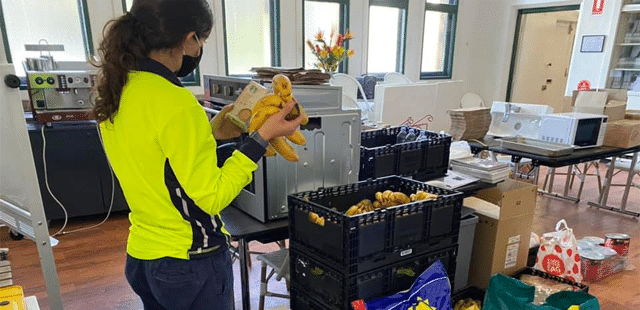Heaven at the Hill warns that more families will need food support

PHOTO: FACEBOOK: HEAVEN AT THE HILL
By Chris Shearer
4 October 2021
A church meals program says it has seen a growing number of families requiring food support, and expects numbers to continue to rise as federal Covid disaster payments are cut off sometime in November.
Director of operations Heaven at the Hill Dr Ree Boddé said its meal program, which is run out of St Peter’s Eastern Hill, had served over 110,000 meals to those in need since March 2020.
The majority of these have gone to international students who were not eligible for government support during the pandemic, but in the past few months there has been an uptick in the number of families arriving at their distribution centre, Dr Boddé said.
“What we’re finding is that a lot of people are losing their jobs … [and] are starting to access food relief,” she told The Melbourne Anglican.
“Some of them are so well dressed you wouldn’t even know. It’s people that you usually wouldn’t see at these sort of places, fairly middle-class families basically.
“It’s an emerging need. Where we used to have mostly international students and students, now we’re getting families front up too looking for grocery items and food.”
Dr Boddé said there were about 10-15 families coming each week to their distribution centre, and expected that number to grow in the coming months.
“It’s not going to go away,” she said.
“What I’ve been told is that there is no work. So this is going to be with us for a while.”
Further pain is expected later in the month as the percentage of fully vaccinated Victorians reaches 70 per cent, triggering the winding-down of federal Covid disaster payments. Two weeks after the state reaches 80 per cent fully vaccinated the payments will be drastically reduced to pre-pandemic levels, which welfare groups have called “unconscionable”.
Around $9bn in payments has been distributed to some 2.16 million Australians since June this year.
Heaven at the Hill receives just over 500 pre-packaged meals and other groceries from FareShare, an organisation that rescues surplus food and cooks over 26,000 meals each week for food relief charities. Kitchen manager Crickette DerJeu said the demand for free and nutritious meals had grown enormously over the past few months.
“We have never had a waiting list and we’re prioritising charities that have more need than probably ever before,” she told The Melbourne Anglican.
“We’ve never seen the need for our meals more than what we do now.”

FareShare drops off pre-packaged meals
Dr Boddé said that while the program was now receiving some funding from the state government, more was needed. Those wishing to support the program could visit their website. She also encouraged those wishing to donate food to consider non-perishable items, particularly canned foods.
Those wishing to support the work of FareShare can do so in a variety of ways here.







